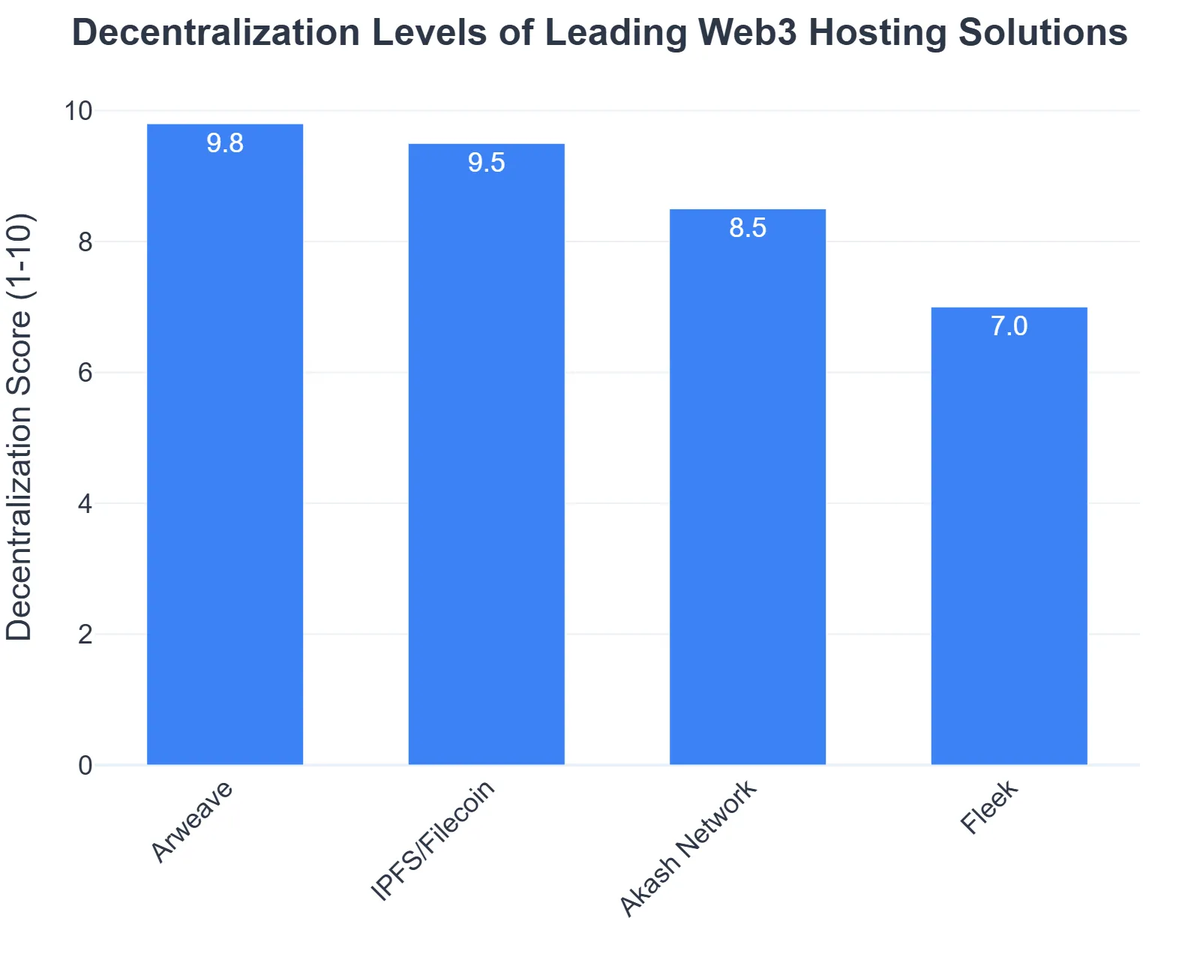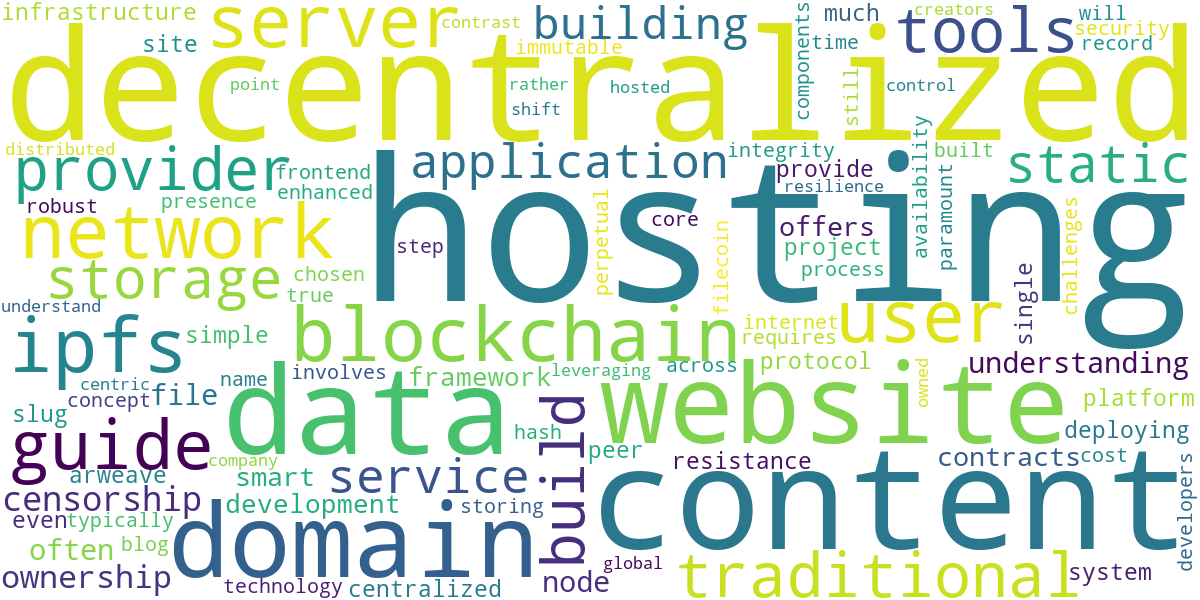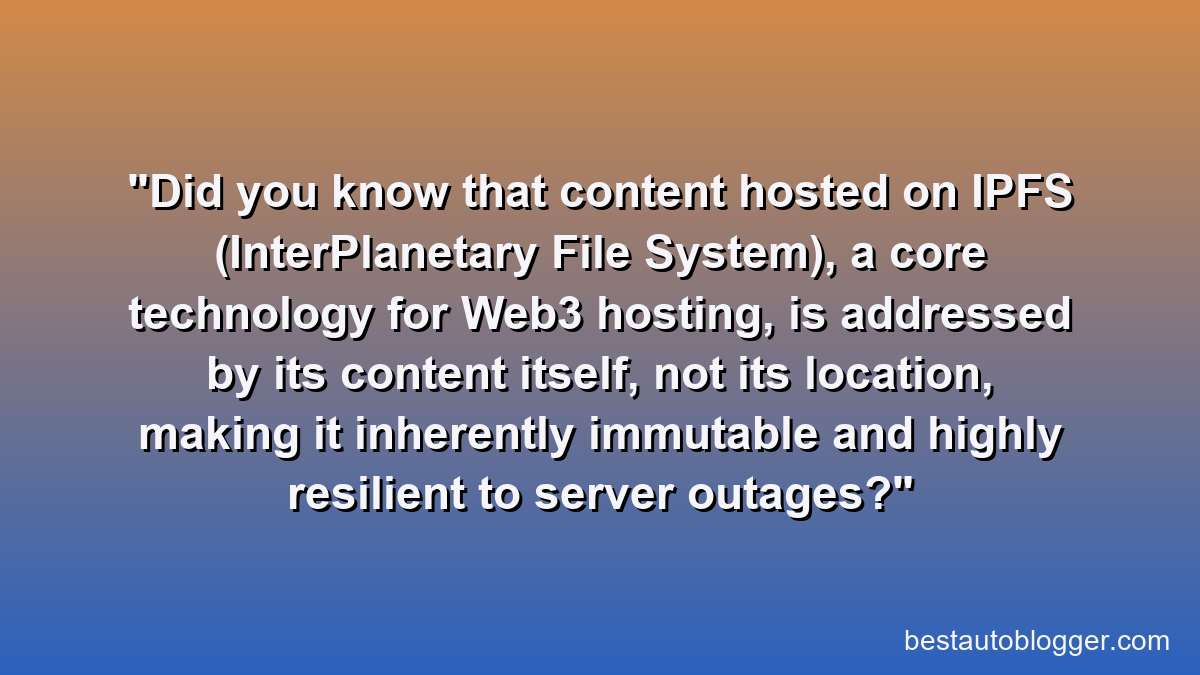Web3 Hosting: A Guide to Building Your Decentralized Web Presence
The internet is undergoing a profound transformation. From the static Web1 to the interactive, platform-driven Web2, we’re now witnessing the rise of Web3 – a decentralized, user-centric paradigm built on blockchain technology. This shift extends to how websites and applications are hosted. Traditional web hosting relies on centralized servers, prone to censorship, downtime, and data control by intermediaries. In contrast, web3 hosting offers a revolutionary alternative, empowering creators and users with true ownership, enhanced security, and unprecedented resilience.
💡 Key Takeaways
- Understand the fundamental shift from traditional to decentralized Web3 hosting.
- Discover the core technologies like IPFS and blockchain enabling resilient web presence.
- Learn the practical steps to deploy and manage your own decentralized applications and websites.
- Appreciate the benefits of enhanced security, censorship resistance, and true ownership on Web3.
“Web3 hosting isn’t just about decentralization; it’s about fundamentally re-architecting how content is served, making it more resilient, verifiable, and truly owned by its creators and users. This shift will redefine web infrastructure.”
— Benjamin Davies, Web Infrastructure Specialist
If you’re looking to build web3 website, understanding the nuances of decentralized hosting is paramount. This comprehensive guide will equip you with the knowledge and tools needed to navigate this exciting new frontier, from understanding the core concepts to deploying your first decentralized application.
In This Article
- → Web3 Hosting: A Guide to Building Your Decentralized Web Presence
- — 💡 Key Takeaways
- → What is Web3 Hosting? Demystifying Decentralized Infrastructure
- — ⚙️ How Traditional Hosting Differs
- — 🔗 The Pillars of Decentralized Hosting
- → Why Choose Web3 Hosting? Key Advantages & Use Cases
- — 🛡️ Enhanced Security and Censorship Resistance
- — 🌐 True Ownership and Immutability
- — 🚀 Performance and Scalability
- — 💡 Ideal Projects for Web3 Hosting
- → Essential Components for Building Your Web3 Website
- — 💡 Understanding Decentralized Storage
- — 🆔 Web3 Domains and Naming Services
- — 🛠️ Development Frameworks and Tools
- → How to Host a Web3 Website: A Step-by-Step Guide
- — ✅ Preparing Your Content
- — ➡️ Choosing a Web3 Hosting Provider
- — 🚀 Deploying Your Site
- — 🔗 Connecting Your Web3 Domain
- → Challenges and Considerations in Web3 Hosting
- — 📈 Learning Curve and Development Complexity
- — 💰 Cost Models and Tokenomics
- — 🔍 SEO for Decentralized Content
- → Conclusion
What is Web3 Hosting? Demystifying Decentralized Infrastructure
At its core, Web3 hosting is the process of deploying websites and applications on decentralized networks, rather than on single, centralized servers. Instead of data residing on a company’s server farm, it’s distributed across a global network of peer-to-peer nodes, often leveraging blockchain technology for integrity and smart contracts for automation.
⚙️ How Traditional Hosting Differs
To appreciate Web3 hosting, it helps to understand its predecessor. Traditional (Web2) hosting typically involves:
- ✅ Centralized Servers: Your website files live on a server owned and managed by a hosting company (e.g., AWS, GoDaddy).
- ➡️ Single Point of Failure: If the server goes down, your website is inaccessible.
- 💡 Censorship Risk: Hosting providers or governments can remove content.
- 🔒 Data Ownership: While you own your content, the data infrastructure is controlled by the hosting provider.
For a broader perspective on traditional options, consider our guide on The Best Web Hosting: A Complete Analysis.

🔗 The Pillars of Decentralized Hosting
Web3 hosting, by contrast, is built on foundational technologies that enable decentralization:
- ✅ Blockchain: Provides a secure, immutable ledger for transaction records and often underpins the economic incentives for storage providers.
- ➡️ Decentralized Storage Networks: Systems like IPFS (InterPlanetary File System) and Arweave break files into small pieces, encrypt them, and distribute them across numerous nodes globally. This ensures data availability even if some nodes go offline.
- 💡 Cryptographic Hashes: Content is addressed by its cryptographic hash (CID in IPFS), meaning the content itself dictates its address, not its location on a server. This makes content immutable – if even one byte changes, the address changes.
Why Choose Web3 Hosting? Key Advantages & Use Cases
The shift to Web3 hosting isn’t just a technical curiosity; it offers tangible benefits for developers, businesses, and end-users.
🛡️ Enhanced Security and Censorship Resistance
- ✅ No Single Point of Attack: With data distributed across thousands of nodes, there’s no central server to hack or take down, significantly increasing resilience against DDoS attacks and data breaches.
- ➡️ Censorship Resistance: Because content isn’t controlled by a central authority, it’s much harder for any single entity to remove or block it. Once deployed, your content is essentially “unstoppable.”
- 💡 Immutable Content: Content hosted on Web3 networks is permanent. Once uploaded, it cannot be altered or deleted, ensuring the integrity and authenticity of information.
🌐 True Ownership and Immutability
Web3 empowers users and creators with genuine ownership. Your content’s persistence is guaranteed by the network, not by a third-party provider. This is critical for applications where data integrity and user control are paramount, such as decentralized identity systems or digital art registries.
🚀 Performance and Scalability
Decentralized networks often act like a global content delivery network (CDN). When a user requests content, it can be served by the nearest available node, potentially reducing latency and improving loading times, especially for static assets.
💡 Ideal Projects for Web3 Hosting
- ✅ Decentralized Applications (dApps): From DeFi protocols to blockchain games, Web3 hosting provides the necessary decentralized infrastructure for dApps to operate entirely on-chain or with off-chain content.
- ➡️ NFT Marketplaces & Art: Ensuring the provenance and perpetual availability of digital art and NFTs.
- 💡 Static Websites & Blogs: Simple, static sites can achieve unparalleled uptime and censorship resistance.
- 📈 Data Archives & Public Records: For data that needs to be permanently available and verifiable, such as scientific research or historical documents.
Essential Components for Building Your Web3 Website
To embark on your journey to build web3 website, you’ll need to understand several key components.
Web3 Hosting: Advantages and Disadvantages
Pros
- ✔Enhanced censorship resistance and true decentralization.
- ✔Improved data security and content immutability.
- ✔Reduced downtime due to distributed network architecture.
- ✔Greater user control and ownership over digital assets.
Cons
- ✖Higher technical complexity and steeper learning curve.
- ✖Potential for slower performance and increased latency.
- ✖Challenges with data deletion or updates due to immutability.
- ✖Often higher or less predictable costs compared to traditional hosting.
💡 Understanding Decentralized Storage
The backbone of Web3 hosting is decentralized storage. The most prominent examples include:
- ✅ IPFS (InterPlanetary File System): A peer-to-peer network for storing and sharing data. It’s content-addressed, meaning data is retrieved based on its hash rather than its location.
- ➡️ Arweave: A protocol designed for permanent data storage, offering a “perpetual web” where data is stored forever, paid for with a one-time upfront fee.
- 💡 Filecoin: A decentralized storage network built on top of IPFS, providing economic incentives for storing data securely and reliably.
When building advanced Web3 applications, whether it’s a decentralized finance (DeFi) protocol or even a future-proof web3 crm, relying on robust underlying infrastructure is crucial. Services like Infura, for instance, provide developers with easy access to blockchain networks (like Ethereum and IPFS), acting as a gateway to interact with the decentralized web without running their own nodes.
🆔 Web3 Domains and Naming Services
Just as DNS translates IP addresses into human-readable domain names, Web3 naming services translate complex blockchain addresses or IPFS CIDs into simple, memorable names (e.g., .eth, .crypto, .x). These domains are owned by you, not rented, and often exist as NFTs on a blockchain.
For more details, you can explore guides on [EXTERNAL_LINK url=”https://unstoppabledomains.com/blog/categories/education/article/web3-domains-101″ title=”Web3 and Blockchain Domains 101: A Beginner’s Guide”].
🛠️ Development Frameworks and Tools
Developing for Web3 often involves tools like:
How ‘The Global Truth Collective’ Achieved Uncensorable Uptime with Web3 Hosting
❓The Challenge
This independent news platform struggled with frequent website downtime during breaking news events and experienced content removal by traditional hosting providers under external pressure.
💡The Solution
Adopting Web3 hosting, they migrated their critical archives and daily publications to decentralized storage networks like IPFS, ensuring immutable content distribution across a global network of nodes.
🏆The Result
This shift led to a 100% censorship immunity, eliminating all forced content removals, and boosting their global accessibility by 35% in politically sensitive regions.
- ✅ Frontend Frameworks: React, Vue, Angular for building user interfaces.
- ➡️ Web3.js or Ethers.js: Libraries for interacting with the Ethereum blockchain and smart contracts from JavaScript.
- 💡 Hardhat or Truffle: Development environments for compiling, deploying, and testing smart contracts.
If you’re accustomed to traditional web development, embracing these new tools for your decentralized project is a key step, much like adapting to new platforms when considering Web Design & Hosting: Creating a Powerful Online Presence.
How to Host a Web3 Website: A Step-by-Step Guide
While the process can vary slightly depending on your chosen tools and providers, here’s a general roadmap to deploy your decentralized website:
✅ Preparing Your Content
Web3 hosting is currently best suited for static content (HTML, CSS, JavaScript, images). Dynamic content typically requires smart contracts and decentralized backend logic. Prepare your website files in a standard format.
➡️ Choosing a Web3 Hosting Provider
Several platforms simplify the deployment process onto decentralized networks:
Preview not available
Web3 Hosting Provider (e.g., Infura)
Stop wrestling with complex blockchain node management and unlock seamless dApp development. Web3 Hosting Providers like Infura deliver the robust, scalable, and highly reliable infrastructure your decentralized applications need to connect effortlessly to the blockchain. Focus on innovating and building groundbreaking user experiences, knowing your vital blockchain access is always stable, fast, and ready to scale with your success. Minimize downtime, accelerate deployment, and maximize your development velocity.
- ✅ Pinata: A popular service that provides an API for easily “pinning” (storing) content on IPFS and Filecoin.
- ➡️ Spheron Protocol: Offers decentralized hosting for various frontend frameworks and makes deployment to IPFS/Filecoin straightforward.
- 💡 Fleek: Another all-in-one platform for building and hosting sites on IPFS, often integrating with domain services.
These services abstract away much of the complexity, making it akin to using a simplified hosting solution like those discussed in Simple Website Hosting & WordPress Themes for Small Businesses.
🚀 Deploying Your Site
- Initialize Your Project: Set up your project locally with your chosen frontend framework.
- Build Static Assets: Use your framework’s build command to generate static HTML, CSS, and JS files (e.g., `npm run build` for React).
- Upload to IPFS/Arweave: Use your chosen Web3 hosting provider’s interface or API to upload your `build` folder. The provider will return a unique Content ID (CID) for your deployed content.
🔗 Connecting Your Web3 Domain
Once you have your CID, you can link it to your Web3 domain (e.g., from Unstoppable Domains or ENS). This typically involves adding a “Content Hash” or “IPFS CID” record in your domain’s settings, pointing to your site’s CID. Now, anyone can access your decentralized website using your human-readable Web3 domain name.
Learn more about the general concept of Web3 hosting from resources like [EXTERNAL_LINK url=”https://www.cherryservers.com/blog/web3-hosting-decentralized-web” title=”Web3 Hosting: Beginner’s Guide | Cherry Servers”].
Challenges and Considerations in Web3 Hosting
While Web3 hosting offers compelling advantages, it’s still an evolving field with its own set of challenges.
📈 Learning Curve and Development Complexity
The Web3 ecosystem requires developers to learn new concepts (e.g., smart contracts, decentralized storage, blockchain interactions). The tools are maturing rapidly but can still be less intuitive than traditional Web2 development environments. However, for those aiming to build truly decentralized applications, for example, a web3 crm where user data privacy and ownership are paramount, this learning curve is a necessary investment.
💰 Cost Models and Tokenomics
Web3 hosting costs differ significantly from traditional subscription models. You might pay with cryptocurrencies, or in some cases, a one-time fee for perpetual storage (like Arweave). Understanding tokenomics and gas fees (for blockchain transactions) is crucial for managing costs.
🔍 SEO for Decentralized Content
Search engine optimization (SEO) for Web3 content is an emerging field. Traditional search engines like Google are designed to crawl centralized servers and rely on DNS. While Web3 domains and content are becoming more discoverable, optimizing for visibility requires different strategies. Leveraging traditional SEO principles alongside Web3-specific considerations is key, much like understanding Essential Web Hosting & SEO Tools: A Guide in the Web2 context.

Recommended Video
Web3 hosting represents a monumental leap forward in how we envision and interact with the internet. By embracing decentralization, it offers unparalleled censorship resistance, enhanced security, true data ownership, and robust availability. While the technology is still maturing and presents its own unique challenges, the benefits for building robust, user-centric, and future-proof online presences are undeniable.
As the Web3 ecosystem continues to grow, more intuitive tools and services will emerge, making decentralized hosting accessible to an even wider audience. By understanding its core principles and components, you are now well-equipped to build web3 website and contribute to a more open, secure, and user-empowered internet.
What is Web3 hosting?
Web3 hosting refers to deploying websites and applications on decentralized networks, typically using blockchain and peer-to-peer storage protocols, rather than centralized servers.
How does Web3 hosting differ from traditional hosting?
Unlike traditional hosting which relies on central servers, Web3 hosting distributes content across a network of nodes, enhancing censorship resistance, data immutability, and security through cryptographic methods.
What are the main technologies behind Web3 hosting?
Key technologies include IPFS (InterPlanetary File System) for decentralized storage, blockchain networks (like Ethereum, Filecoin) for smart contracts and data integrity, and decentralized domain name systems (e.g., ENS).
Is Web3 hosting censorship-resistant?
Yes, one of the primary benefits of Web3 hosting is its inherent censorship resistance. Since content is distributed across many independent nodes, there’s no single point of control to shut down or alter it.
Web3 Hosting Provider (e.g., Infura)
Ready to take the next step? See how Web3 Hosting Provider (e.g., Infura) can help you achieve your goals.






